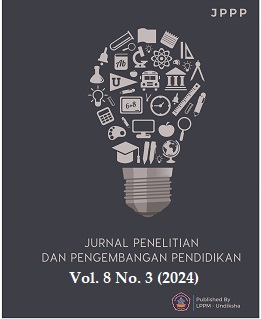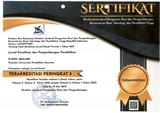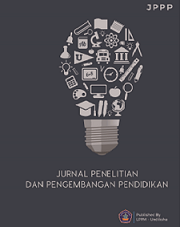Self-Regulated Learning on Academic Stress of Students Working on Their Thesis
DOI:
https://doi.org/10.23887/jppp.v8i3.77810Keywords:
Self Regulated Learning Training, Academic Stress, College Students ThesisAbstract
Final-year students have a lot of academic burdens, so it is easier to trigger academic stress. Strategies can be given to reduce academic stress, namely self-regulated learning. The study aims to measure the effectiveness of self-regulated learning training on academic stress for students working on their thesis. The quantitative research approach uses a randomized pretest-posttest control group experimental design. Data collection uses the academic stress scale. Data management is a difference test and an effect size test. The 10 research participants were divided into two groups, namely, 5 participants in the experimental group and 5 participants in the control group. The study's results showed that students' academic stress decreased after being given self-regulated learning training. A comparison of the two groups of participants, namely the experimental group, showed that they experienced a decrease in academic stress while the control group did not experience any changes in academic stress. The difference test and effect size results showed changes and significant influences in the experimental group after being given self-regulated learning training. Based on the follow-up results, it was stated that self-regulated learning training can be applied to academic problems, including academic stress.
References
Agusmar, A. ., Vani, A. ., & Wahyuni, S. (2019). Perbandingan tingkat stress mahasiswa Angkatan 2018 dengan angakatan 2015. Health & Medical Journal, 1(2), 34–37. https://doi.org/10.33854/heme.v1i2.238.
Arwina, A., Fadilah, R., & A, M. (2022). The Correlation between Self Regulation and Stress Academic with Academic Procrastination College Students Faculty of Psychology Universitas Medan Area. Journal of Education, Humaniora and Social Sciences (JEHSS), 4(4). https://doi.org/10.34007/jehss.v4i4.988.
Cadime, I., Pinto, A. M., Lima, S., Rego, S., Pereira, J., & Ribeiro, I. (2016). Well-being and academic achievement in secondary school pupils: The unique effects of burnout and engagement. Journal of Adolescence, 53, 169–179. https://doi.org/10.1016/j.adolescence.2016.10.003.
Candra, I., & Rani, M. (2022). Pengaruh Self Regulated Learning, Grit terhadap Stres Akademik dalam Pembelajaran Online dimasa Pandemi Covid-19 pada Mahasiswa di Kota Padang Berbasis Teknologi Informasi. Jurnal Psikohumanika, 14(1), 26–40.
Febriani, I., & Simanjuntak, E. (2021). Self regulated learning dan Stres Akademik Pada Mahasiswa. Jurnal Experientia, 9(2). https://doi.org/10.33508/exp.v9i2.3350.
Febrianti, D., & Husniawati, N. (2021). Hubungan Tingkat Depresi dan Faktor Resiko Ide Bunuh Diri pada Remaja SMPN. Jurnal Ilmiah Kesehatan, 13(1), 85–94. https://doi.org/10.37012/jik.v13i1.422.
Febrianti, S. ., & Husniawati, I. (2021). Description of Stress and Its Impact on Students. InSight, 20(2). https://doi.org/10.26486/psikologi.v20i2.240.
Fuente, J. D. ., Paoloni, P. ., Vera-Martinez, M. ., & Garzon-Umerenkova, A. (2020). Effect of Levels of Self-Regulation and Situational Stress on Achievement Emotions in Undergraduate Students: Class, Study and Testing. Int. J. Environ. Res. Public Health, 19(18), 11720. https://doi.org/10.3390/ijerph191811720.
Fuente, J. D. ., Peralta-Sánchez, F. ., Martínez-Vicente, J. ., Sander, P., Garzón-Umerenkova, A., & Zapata, L. (2020). Effects of Self-Regulation vs. External Regulation on the Factors and Symptoms of Academic Stress in Undergraduate Students. Front Psychol, 11, 1773. https://doi.org/10.3389/fpsyg.2020.01773.
Galizty, R. C. M. ., & Sutarni, N. (2021). The Effect of Student Resilience and Self regulated learning on Academic Achievement. Pedagonal : Jurnal Ilmiah Pendidikan, 5(2), 62–69. https://doi.org/10.33751/pedagonal.v5i2.3682.
Jakesova, J., Gavora, P., & Kalenda, J. (2016). Self-regulation of Behavior: Students Versus Other Adults. International Journal of Educational Psychology, 5(1), 56–79. https://doi.org/10.17583/ijep.2016.1661.
Karos, K. A., Suarni, W., & Sunarjo, I. S. (2021). Self regulated learning dan Stres Akademik pada Mahasiswa. Jurnal Sublimapsi, 2(3), 62. https://doi.org/10.36709/sublimapsi.v2i3.17962.
Kirana, A., & Juliartiko, W. (2021). Self regulated learning dan Stres Akademik saat Pembelajaran Daring di Masa Pandemi Covid-19 pada Mahasiswa Universitas X di Jakarta Barat. Jurnal Psikologi, 14(1). https://doi.org/10.35760/psi.2021.v14i1.3566.
Martínez-Martí, M. L., & Ruch, W. (2017). Character strengths predict resilience over and above positive affect, self-efficacy, optimism, social support, self-esteem, and life satisfaction. Journal of Positive Psychology, 12(2), 110–119. https://doi.org/10.1080/17439760.2016.1163403
Pasaribu, P. ., & Zarfiel, M. . (2018). Cognitive Behavioral Therapy Treatment for Reducing Stress: A Case Study of Self-Acceptance in an Early Adult College Student. Advances in Social Science, Education and Humanities Research, 229. https://doi.org/10.2991/iciap-18.2019.54.
Priskillaa, V. (2020). The Influence of Intellectual Intelligence, Emotional Intelligence, and Spiritual Intelligence on Student Understanding Level. SSRN, June. https://doi.org/10.2139/ssrn.3637760.
Rahayu, R. A., Kusdiyati, S., & Borualogo, I. S. (2021). Pengaruh Stress Akademik terhadap Resiliensi pada Remaja di Masa Pandemi Covid-19. Prosiding Psikologi, 7(2). https://doi.org/10.29313/.v0i0.28372.
Ramanda, P., & Sagita, D. . (2020). Stres Akademik Mahasiswa dalam Menyusun Skripsi dimasa Pandemi Covid-19. Jurnal KOPASTA: Jurnal Program Studi Bimbingan Konseling, 7(2), 94–100. https://doi.org/10.33373/kop.v7i2.2146.
Ramli, N. H. ., Alavi, M., Mehrinzhad, S. ., & Ahmadi, A. (2018). Academic Stress and Self-Regulation among University Students in Malaysia: Mediator Role of Mindfulness. Behavioral Sciences, 8(12). https://doi.org/10.3390/bs8010012.
Ribeiron, I. J. ., Pereira, R., Freire, I. ., Oliveira, B. ., Casotti, C. ., & Boery, E. . (2018). Stress and Quality of Life Among University Students: A Systematic Literature Review. Health Professions Education, 4, 70–77. https://doi.org/10.1016/j.hpe.2017.03.002.
Riskiyani, D., Hartati, M., & Sugiyo, S. (2018). Hubungan antara kematangan emosi dan self regulation dengan kemampuan penyesuaian diri pada siswa kelas VII SMP Negeri 29 Semarang. Indonesian Journal of Guidance and Counseling: Theory and Application, 6(4). https://doi.org/10.15294/ijgc.v6i4.17604.
Rosyad. (2019). Hubungan Antara Spiritualitas dan Stres pada Mahasiswa yang Mengerjakan Skripsi. Jurnal EL-Tarbawi, 10(2), 39–62.
Sari, P., Bulantika, S. ., Dewantari, T., & Rimonda, R. (2020). Effects of stress coping and emotion regulation on student academic stress. KONSELI: Jurnal Bimbingan Dan Konseling, 7(1), 73–78. https://doi.org/10.24042/kons.v7i1.6300.
Sati, P. L., Amluis, D., & Ronald, J. (2022). Pengaruh Disiplin Belajar, Kecerdasan Emosional, Perhatian Orang Tua, Kemandirian Belajar dan Teman Sebaya Terhadap Prestasi Belajar Ekonomi Siswa Kelas XI SMA Pembangunan Laboratorium UNP. Horizon, 2(3), 289–303. https://doi.org/10.22202/horizon.v2i3.5960
Soekanto, A., & Rianti, E. D. D. (2021). Analisis tingkat kelelahan mahasiswa dalam pembelajaran daring di era pandemik covid-19 tahun ajaran 2020/2021. Jurnal Ilmiah Kedokteran Wijaya Kusuma, 10(2), 154. https://doi.org/10.30742/jikw.v10i2.1446
Sugiono, S. (2020). Industri Konten Digital Dalam Perspektif Society 5.0 (Digital Content Industry in Society 5.0 Perspective. Jurnal IPTEKKOM (Jurnal Ilmu Pengetahuan & Teknologi Informasi), 22(2). https://doi.org/10.33164/iptekkom.22.2.2020.175-191
Sugiyono. (2019). Metode Penelitian; Kuantitatif, Kualitatif, dan R&D. Alfabeta.
Vila, S., Gilar-Corbí, R., & Pozo-Rico, T. (2021). Effects of student training in social skills and emotional intelligence on the behaviour and coexistence of adolescents in the 21st century. International Journal of Environmental Research and Public Health, 18(10), 5498. https://doi.org/10.3390/ijerph18105498.
Wakhyudin, H., & Putri, A. D. S. (2020). Analisis kecemasan mahasiswa dalam menyelesaikan skripsi. Jurnal Pendidikan, 1(1), 14–18. https://doi.org/https://doi.org/10.24176/wasis.v1i1.4707
Downloads
Published
How to Cite
Issue
Section
License
Copyright (c) 2024 Dedi Nasruddin

This work is licensed under a Creative Commons Attribution-ShareAlike 4.0 International License.
Authors who publish with the Jurnal Penelitian dan Pengembangan Pendidikan agree to the following terms:
- Authors retain copyright and grant the journal the right of first publication with the work simultaneously licensed under a Creative Commons Attribution License (CC BY-SA 4.0) that allows others to share the work with an acknowledgment of the work's authorship and initial publication in this journal.
- Authors are able to enter into separate, additional contractual arrangements for the non-exclusive distribution of the journal's published version of the work (e.g., post it to an institutional repository or publish it in a book), with an acknowledgment of its initial publication in this journal.
- Authors are permitted and encouraged to post their work online (e.g., in institutional repositories or on their website) prior to and during the submission process, as it can lead to productive exchanges, as well as earlier and greater citation of published work. (See The Effect of Open Access)








